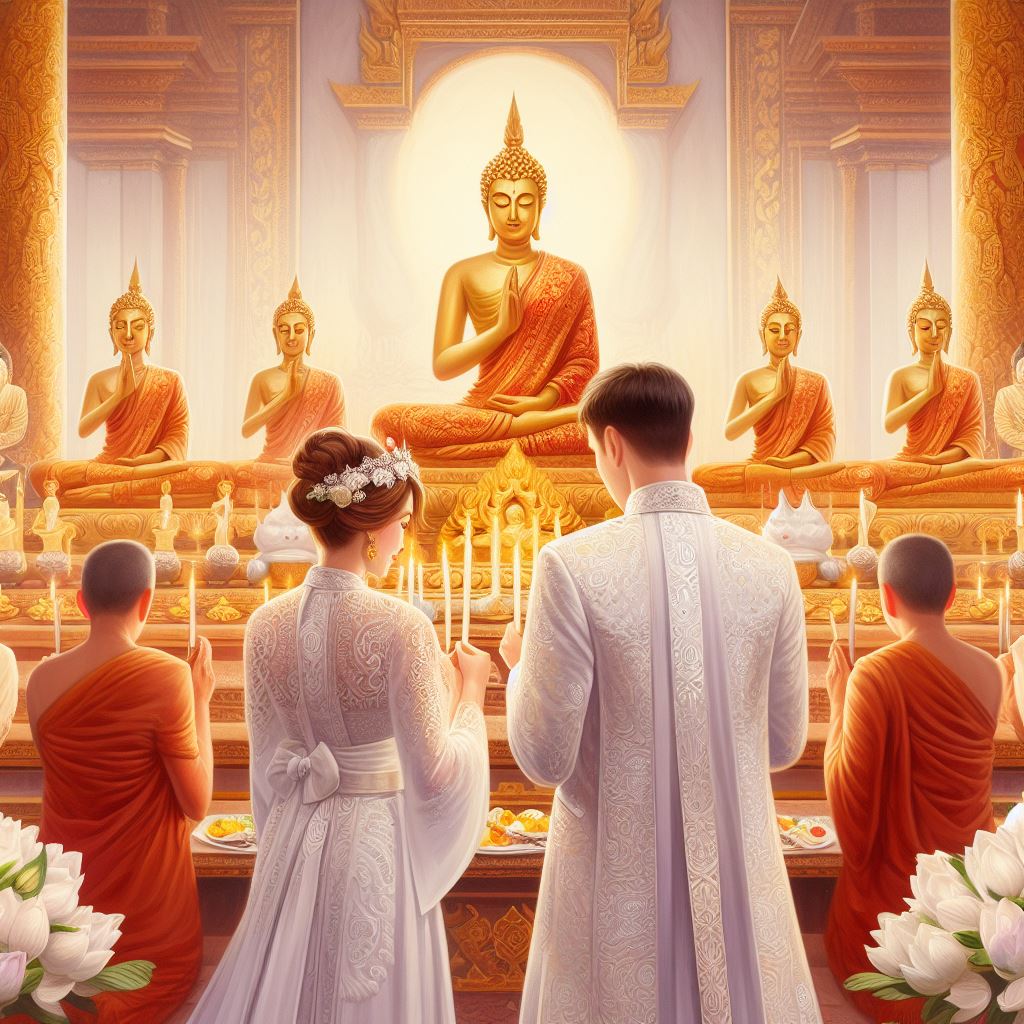
Buddhism emphasizes the importance of a happy married life. According to Ven. K. Sri Dhammananda, a Buddhist monk, a happy married life is based on tolerance, trustworthiness, mutual understanding, selflessness, respect, virtue, fulfilling obligations, honesty, security, good verbal conduct, and companionship. This means being fully present in the relationship, listening actively, and understanding the needs and emotions of one’s partner. By cultivating mindfulness, couples can develop deeper connections and communicate more effectively.
The Buddha has taught many suttas regarding married life to the laities to maintain their lives happily. Buddhism teaches that the husband and wife should fulfill their duties towards each other to avoid separation or divorce. The Buddha also emphasized the importance of love and attentiveness in a marriage.
The most popular suttars are Singalovada Sutta, Uggaha Sutta, Sanvasa Sutta, Samajivi Sutta, Mallika Sutta, Sattabhariya Sutta in the Digha Nikaya and the Anguttara Nikaya. There is also a series of stories of a famous Buddhist couple about ‘Nakula Mata and Nakula Pita’ who can be deemed as good role models to emulate for lay-married couples, in order to live in harmony, loving-kindness, and mutual understanding with each other.
Moreover, if there is mutual understanding and faith between spouses it will bring happiness to the whole family and enable them to live in peace and harmony throughout their life and afterlife.

The most famous Singalovada Sutta reveals the duties of husband and wife. According to this Sutta, the husband’s responsibilities are categorized as follows,
(i) By being courteous to her,
(ii) By not despising her,
(iii) By being faithful to her,
(iv) By handing over authority to her,
(v) By providing her with adornments.
On the other hand, as mentioned in the same Sutta, the wife should be mindful of five responsibilities towards her husband such as:
(i) She performs her duties well,
(ii) She is hospitable to relations and attendants
(iii) She is faithful,
(iv) She protects what he brings,
(v) She is skilled and industrious in discharging her duties.
Thus, by following these Buddhist concepts, anyone can get guidance in order to develop their moral character and thereby benefit in life. Consequently, moral thoughts will lead to protecting the bondage enriching relationships between the spouses and family members and creating a peaceful environment.
In the discourse of the seven wives (Satta Bhariya Sutta), the Buddha has categorized wives into seven types according to their characters as follows.
- A wife like a killer,
- A wife like a thief,
- A wife like a dictator,
- A wife like a mother,
- A wife like a sister,
- A wife like a friend, and
- A wife like a bondservant.
As mentioned above, the first three of these seven wives cannot be accepted as good and virtuous wives due to their bad behavior and deeds towards their husbands and other family members. According to their characteristic thoughts, they do not have mercy, engage in illicit affairs, do not respect their husbands, always try to discard the husband’s relations, steal the husbands’ earnings and valuable things, dictate bad, rough and hurtful words and try to control the husbands in every situation.
These three wives of killer, thief and dictator always bring unhappiness to the family which creates issues among the family members.
On the other hand, the other four wives motherly wife, sisterly wife, friendly wife, and bondservant wife possess good qualities, do good deeds, conduct themselves well, and act as friends towards their husbands in their daily lives.
Accordingly, these moralistic and good wives develop their mercy, sympathy and kindness, constantly protect their husbands, provide good food for them, take care of their husbands as their own elder brothers, stay close to them, develop friendly manners as friends, smiles and share jokes with understanding, use kind words, do not get angry, try to fulfill needs of husbands, do every domestic work cooperatively and willingly, always try to keep the family happy and are sincere, genuine to each and every relative of both families. Hence, the Buddha has advised to associate those wives because they are able to maintain and sustain the happiness among their children and husbands. As stated above, in this society, there are some husbands who ill-treat their wives like the first three wives.
On the other hand, we can find friendly husbands who protect their wives as fathers and elder brothers and uphold their happiness at home sharing and caring, leading a harmonious life.
The discourse of the Samvasa Sutta in the Anguttara Nikaya elucidates spouses in four ways. The Buddha has divided husbands and wives according to their wholesome and unwholesome thoughts, virtues, behavior and deeds.
Accordingly, the categorized spouses are:
1. A zombie man living with a zombie woman
2. A zombie man living with a Goddess
3. A God living with a zombie woman
4. A God living with a Goddess
The last category ‘A God and a Goddess’ is the most wholesome, ideal pair as the husband and wife cooperate with everyone due to their good will and good conduct in society. They do not harm anyone and perform their duties and obligations to each other respectfully. They possess good qualities, and manners, believe in merits, demerits, and Karmic power (actions) according to Buddha’s teaching, and they avoid committing wrong deeds or unwholesome acts at all times.
In brief, Buddhism provides valuable insights into how to lead a happy married life. By following these principles and fulfilling their duties towards each other with love and attentiveness, couples can build a strong foundation for a long-lasting relationship. These diverse Buddhist teachings elaborate on how laymen and women can live harmoniously together enjoying marital bliss and leading a contented life in this short life span.

